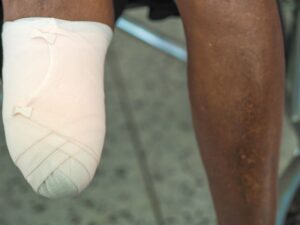Workers’ Compensation Benefits for Amputation

Losing a limb due to a workplace accident changes your life forever. In Arizona, the workers’ compensation system pays eligible employees’ medical expenses and provides a portion of their lost wages while they recuperate. But far too often, injured workers struggle to get the full benefits they are entitled to. If you’re recovering from an amputation, you can’t afford delays or denials. Let an attorney from Matt Fendon Law Group stand up for you.
Our workers’ compensation lawyers offer top-notch client service to injured and disabled workers. Founding attorney Matt Fendon is board-certified in workers’ compensation law, giving our firm the knowledge and experience to tackle the most complex cases. If you’re living with a disfiguring job work injury, let us help you pursue maximum workers’ compensation benefits so you can live comfortably while you rebuild your life.
What is an Amputation?
An amputation is the partial or total removal of a limb, digit, or extremity from the rest of the body. Amputations may be traumatic, which happening directly due to an accident. They could also be surgical, performed by a doctor out of medical necessity. For example, a surgeon may need to amputate a limb if it is crushed or partially severed in a workplace accident and it is the only way to save a victim’s life.
Common amputations stemming from a job injury include:
- Partial hand amputation – Removal of parts of the hand, such as the fingers
- Metacarpal amputation – Removal of the entire hand up to the wrist joint
- Wrist disarticulation – Removal of the whole hand and the wrist joint
- Below-elbow amputation – Removal of the hand, wrist, and part of the forearm
- Arm amputation – Removal of the arm up to the shoulder joint
- Partial foot amputation – Removal of part of the foot, such as the toes
- Ankle disarticulation – Removal of the entire foot up to the ankle
- Transtibial amputation – Removal of the leg below the knee
- Transfemoral amputation – Removal of the leg and knee
- Hip disarticulation – Removal of the entire leg, including the femur, up to the hip joint
- Hemipelvectomy – Removal of both legs and parts of the pelvis
Common Causes of Workplace Amputations
Some of the most common causes of workplace amputation are:
- Slip-and-fall accidents – Landing wrong on a limb can shatter bones irrevocably, leading to an amputation.
- Contact with sharp objects or equipment – Workers who use power tools and other industrial equipment can lose all or part of a limb if they come into contact with a sharp object or surface. Saws, food slicers, belt sanders, and similar tools can sever body parts or injure them so badly that they require surgical removal.
- Falling objects – An employee struck or crushed by a falling object could lose a limb due to the sudden trauma. Construction workers, factory workers, and dock workers are particularly prone to this type of amputation injury.
- Caught-between accidents – Machinery should be guarded to prevent workers from getting caught or pinched during operation. Inadequate safeguarding could result in a traumatic amputation.
- Equipment malfunctions – Workers can suffer catastrophic harm when heavy industrial equipment breaks down due to poor maintenance.
- Fires and explosions – Severe burns can cause enough damage to the skin, muscle tissues, and bone to require amputation.
- Inadequate training – Many industrial accidents stem from improper safety training. If workers do not know how to use their equipment correctly, they might take unsafe risks or use the equipment in an unintended way, leading to an amputation.
- Lack of safety equipment – Employers should evaluate their equipment’s risks to workers. When they fail to conduct proper hazard analyses, disaster can strike.
Workers’ Compensation Benefits for Amputations in Arizona
If you’ve suffered an amputation because of a workplace accident or illness, workers’ compensation can provide several types of benefits:
- Medical benefits – Your employer’s workers’ compensation carrier is responsible for covering all reasonable and necessary medical expenses related to your amputation injury. Medical benefits include the cost of prosthetics and any replacements you might eventually need.
- Lost wages and disability benefits – Disability benefits offset a portion of the wages you’ve lost due to your work injury. In Arizona, most amputations are classified as scheduled injuries. The amount and duration of benefits for amputation are set by state law.
Get Help From an Arizona Workers’ Compensation Attorney
You could be entitled to substantial benefits through the workers’ compensation system if you suffered an amputation because of a work-related injury or illness. But pursuing these benefits can be frustrating, time-intensive, and subject to red tape. You can improve your chances of getting fair treatment from the insurance company by working with a knowledgeable workers’ comp lawyer.
The attorneys at Matt Fendon Law Group can help you pursue the benefits you need to take care of yourself and plan for the future. Call or contact us today for a free consultation with a top workers’ compensation lawyer.




















